Many people take branched chain amino acids (BCAAs) before and after workouts because they can help with building muscle and muscle recovery.
BCAAs have become a “staple” for athletes and weight trainers for putting on muscle.
Women can check out our BCAA for women rankings, too.
This guide is two parts: Part 1 ranks the top 10 BCAA supplements and part 2 dives deeper into the science.
1. BulkSupplements Pure BCAA 2:1:1
Click here for the lowest price on Amazon
The BCAA offering from BulkSupplements is about as simple and straightforward as they come.
There are only three ingredients: leucine, isoleucine, and valine, the three branched chain amino acids that we use to build muscle.
There's no sugar, flavoring, preservatives, or stabilizers to worry about it. The supplement comes with 750 mg of leucine, 375 mg of isoleucine, and 375 mg of valine per serving, for a branched chain amino acid ratio of 2:1:1.
It's a best-seller at Amazon, and rightfully so.
The actual values of the amino acid contents as determined by laboratory testing differ only slightly—there's an excess of about 50mg of leucine and a deficit of about 100 mg of isoleucine. These differences are trifling, and probably vary a bit from batch to batch.
According to lab testing, Bulk Supplements Pure BCAA contains 96% amino acids, and is not contaminated with any significant amounts of heavy metals or prohibited ingredients.
The absence of any fillers, stabilizers, emulsifiers, sweeteners, or flavoring agents make Bulk Supplements BCAA a great choice if you want absolute control over what you're putting in your body.
2. Optimum Nutrition BCAA powder
Click here for the lowest price on Amazon
One of the flagship products of the internet's most well-known resources on strength training, Optimum Nutrition's branched chain amino acid supplement boasts a 2:1:1 ratio of leucine, isoleucine, and valine.
The amino acid content is very high, with over 98% of the product containing BCAAs by weight.
The only other ingredients, aside from leucine, isoleucine, and valine, are a blend of soybean oil and lecithin, as well as silicon dioxide. The oil and lecithin blend helps to emulsify the solution when mixed into a protein shake.
As with other supplements, this can be very useful if you hate gritty sludge at the bottom of your protein shaker, but can also prove to be a problem if you're not supposed to be consuming soy products as a part of your diet (1).
The silicon dioxide helps prevent the powder from clumping together.
Clumps aren't typically a huge issue if you use a wire ball in your protein shaker, but it can be a pain to measure out the right amount of a supplement if your container is full of two-inch lumps of powder stuck together.
The convenience of silicon dioxide might not be worth it for purists, though—even though it's present in only a small amount, you're still basically adding sand to your BCAA powder.
3. MusclePharm 3:1:2
Click here for the lowest price on Amazon
The branched chain amino acid offering from MusclePharm employs a 3:1:2 ratio of leucine, isoleucine, and valine.
MusclePharm's leucine, isoleucine, and valine content is accurate, and the product contains 95% branched chain amino acids by weight.
One additional ingredient is soy lecithin, which is added as an emulsifier. This makes it easier to blend up into a suspended solution in water. BCAA supplements without an emulsifier might be more prone to “settle out” in your protein shake and leave a gritty residue at the bottom of your bottle.
However, soy lecithin might be a turn-off if you have a soy allergy or are trying to eliminate it from your diet.
This supplement comes in unflavored and flavored varieties. The unflavored version contains only BCAAs and soy lecithin. The flavored versions contain malic acid, artificial flavoring, sucralose, and a colorant. The malic confers a tart, sour taste, while the flavoring makes the supplement go down easier. Sucralose is a non-caloric sugar replacement which sweetens the taste when mixed with water.
For coloring agents, MusclePharm uses natural substances like beet root powder or spirulina powder, which is a nice to see—lots of lesser supplements today will just mix in some red #40 and call it a day.
4. Sheer Strength Labs BCAA
Click here for the lowest price on Amazon
The BCAA capsules sold by Sheer Strength labs are perhaps the best capsule option on the market.
These boast a 2:1:1 leucine:isoleucine:valine ratio, and no extraneous ingredients—other than those three, all that's in the product is gelatin (which makes up the capsule itself) and magnesium stearate, which binds the branched chain amino acid powder together and prevents it from sticking.
Lab testing shows that it is quite pure, with 97% of its contents being branched chain amino acids. The accuracy of its labeling okay, but not stellar: there's a 49 mg excess of leucine and a similar excess of valine, but these discrepancies are not large enough to significantly alter the relative ratios of leucine, isoleucine, and valine in the supplement.
All the usual capsule caveats apply: vegetarians and vegans need not apply; the cost is substantially higher per gram of branched chain amino acids, and you give up the flexibility of graduated measurements for the convenience of discrete, integer measurements of capsules.
The purity and simplicity of Sheer Strength Labs BCAA drives up its cost, making it substantially more expensive than an equivalent powder, so it's definitely not the best budget option if you're shopping around.
5. Dymatize Nutrition BCAA Complex 5050
Click here for the lowest price on Amazon
A simple powder whose only contents are leucine, isoleucine, and valine, plus a bit of silicon dioxide as an anti-clumping agent, Dymatize Nutrition's BCAA Complex 5050 is a solid choice for a branched chain amino acid powder. Its 2:1:1 ratio of the three branched chain amino acids is a safe industry standard.
On the analytical side of things, Dymatize is bested by several of its competitors. It contains only 92% branched chain amino acids by weight, and has some substantial variation in the stated amounts of amino acids present.
For example, the label indicates that there ought to be 2,526 mg of leucine per serving, but laboratory analytics by Labdoor show there's an excess of 154 mg (2).
While this is still only about 6%, it might be an issue if you insist on very high precision—especially if you're only using a small amount of powder for a custom-mixed recovery drink.
If you measure with a scoop, this won't be an issue; any uncertainties of this order of magnitude will be far offset by the variation in scoop size.
6. Cellucor Alpha Amino BCAAs
Click here for the lowest price on Amazon
Cellucor Alpha Amino BCAAs is a vetted top-seller, so why isn't it higher on this list?
It's a powder that contains leucine, isoleucine, and valine in a 2:1:1 ratio, but has some drawbacks compared to other products on the market. First, it has a lot of extra ingredients, some of them active, and some of them not.
In addition to the three branched chain amino acids, Cellucor BCAA also contains three other amino acids: beta alanine, an amino acid that is supposed to help boost anaerobic performance; citrulline malate, which is supposed to help fight fatigue and boost energy levels; and 2-Hydroxyisocaproic acid or HICA, a metabolized form of leucine (4).
Cellucor claims these are superior to normal BCAA mixtures, but there's a lack of solid scientific research supporting this claim.
The supplement also contains flavoring and coloring agents, including citric acid, natural and artificial flavors, silicon dioxide, the noncaloric sweetener sucralose, and red #40.
If you know that you are looking for a blend of BCAAs with other ingredients like beta alanine and HICA, you might think about giving Cellucor BCAA a shot, but there are other products on the market that offer better purity, more value, and more stringent quality control.
7. Jarrow Formulas BCAA
Click here for the lowest price on Amazon
Though it's a more under-the-radar brand, Jarrow Formulas BCAA offering is still a popular and relatively easy to find option.
Unlike most of the other supplements on this list, Jarrow Formulas BCAA comes in capsules only: convenient if you're tired of measuring scoops or hate the mildly astringent taste of BCAA powder, but also a bit more costly.
Jarrow Formulas adds in 500 mg of glutamine per serving, which is a “regular” amino acid (i.e. not branched chain), as well as 5 mg of vitamin B6 (equivalent to 250% of your recommended daily value for that vitamin).
Glutamine is known to prevent muscle wasting in critically ill patients at hospitals, so some strength gurus recommend taking it for building muscle (3).
Vitamin B6 aids in a number of different metabolic functions in your body, including some which involve amino acid synthesis—this is likely why Jarrow Formulas elected to include it in their supplement. The capsule itself contains gelatin (sorry, vegetarians—gelatin is animal-derived), magnesium stearate, and cellulose, which help bind and stabilize the BCAA powder in the capsule.
The inclusion of “extras” like glutamine and vitamin B6 is controversial. If you were going to be taking those two supplements anyways, it's great, but if you're a purist, or just don't want any unnecessary ingredients in your supplement.
8. Muscle Momentum BCAA Force
Click here for the lowest price on Amazon
For capsule fans, Muscle Momentum BCAA Force is an option to consider. Its branched chain amino acid ratio is a bit unusual, with 460 mg of leucine, 156 mg of isoleucine, and 384 mg of valine per serving, which translates into an oddball ratio of 6:2:5.
Like other capsules, it's also rather expensive per serving compared to a powder.
This reflects the increased difficulty of measuring precise amounts of powder into a capsule during the manufacturing process. The purity is quite good, however: over 98% of the contents are branched chain amino acids, by weight.
Since it's a gelatin capsule, it's unsuitable for vegetarians or vegans, and the supplement also contains maltodextrin and magnesium stearate as stabilizers and an excipient (a binder to hold the active substances, in this case the BCAAs).
As is usually the case with capsules versus powder, the tradeoff is convenience and measuring accuracy versus flexibility. Since you can only take an integer number of capsules, you can't adapt as easily to differing BCAA needs throughout your training program, but you don't have to put up with the taste of the powder, and you don't have to fuss around with a protein shaker and a scoop.
Pretty much everyone knows how much of a headache it can be to forget about your protein shaker at the bottom of your gym bag, only to discover it covered in mold days later. Capsules eliminate this possibility.
9. MyProtein BCAA
Click here for the lowest price on Amazon
This blend of branched chain amino acids has exactly three ingredients: leucine, isoleucine, and valine.
They come in a standard 2:1:1 ratio and the powder supplement contains no additional stabilizers, flavoring agents, or anti-caking chemicals. It ranks highly on purity tests, with 95% of its constituents by weight being branched chain amino acids.
Its nutrition label fidelity leaves a bit to be desired, as lab testing shows its valine content to be higher than it should be (an excess of about 200 mg!), and its isoleucine content slightly lower than it should be. Still, its purity and simplicity are hard to beat, so if you are looking for branched chain amino acids and nothing else, it's a fantastic buy.
If you like the concept but can't stand the taste of pure BCAAs, there are also flavored variants of MyProtein which employ sucralose (a noncaloric sweetener), citric acid for sourness, and naturally-derived coloring agents like purple carrot extract.
10. Bodytech BCAA
Click here for the lowest price on Amazon
Bodytech offers another no-nonsense branched chain amino acid formulation. Leucine, isoleucine, and valine in a 2:1:1 ratio, with a small amount of soy lecithin added as an emulsifier to prevent sediment in your water bottle. No flavoring, no stabilizers, and no artificial ingredients. Despite, or perhaps because of this, it's a best-seller.
It does not rank quite as highly on lab purity tests, with only 93% of its contents being pure BCAAs, but further testing shows that its BCAA ratio is very true-to-label: There's only a 56 mg deficit of leucine (2346 mg per serving when there ought to be 2400) and the isoleucine and valine servings are within 7 mg of their stated amounts.
This is better than many other competitors can manage, so if you're looking to be very precise with your measurements and BCAA ratios, Bodytech BCAA is a good choice.
This precision does come at a cost, however, since Bodytech BCAA is more costly on a per-serving basis. If precision is what you're looking for, but there are better options when it comes to value and purity.
Part 2: What are BCAAs, and are they right for you?
BCAAs are a key building block for muscle (5).
Amino acids are your body's basic ingredients for forming all of the proteins in your body. They are the most basic building blocks of life.
Among all amino acids, three of them are special—these are the branched chain amino acids, or BCAAs.
Benefits
A scientific paper published in 2006 by Eva Blomstrand and others at the Karolinska Institutet in Sweden describes how branched chain amino acids boost your body's muscle-building response to exercise (6).
According to the researchers, consuming BCAAs soon after an endurance or resistance workout (i.e. cardio or weights) causes your body to activate its muscle-building pathways more strongly, increasing protein synthesis and boosting strength.
One study cited by Blomstrand et al. showed that a direct branched chain amino acid infusion after doing quadricep raises on a weight machine had a strong effect on three signaling pathways associated with muscle building.
Additional scientific evidence suggests that branched chain amino acids can reduce the breakdown of muscle fibers during exercise and decrease post-workout soreness, which is why BCAAs are found in pre and post workout drinks.
A paper published in the Journal of Nutrition by Yoshiharu Shimomura and other researchers in Japan outlines an experiment in which branched chain amino acids had a substantial effect in reducing soreness in the days following a squat workout (7).
In a placebo-controlled trial, the scientists found that a 5 gram BCAA supplement taken before the squatting protocol reduced soreness over the course of four days when compared to a placebo. The critical point here is that the BCAA supplement was taken prior to the exercise.
Though the exact mechanism by which it prevents muscle soreness is unclear, Shimomura et al. hypothesize that branched chain amino acids reduced the actual breakdown of proteins in the muscles, while leucine in particular increases your production of muscle proteins after a workout.
Because leucine (which is itself one of the three branched chain amino acids) does “double duty” as both a stimulant for protein synthesis and a preventative factor against protein breakdown, BCAA supplements tend to supply relatively more leucine than isoleucine or valine, the two other branched chain amino acids.
There are no solid comparative clinical trials on what the optimal ratio is—there are studies that show, for example, that supplements with a 2:1:1 leucine:isoleucine:valine ratio perform better than a placebo (a supplement containing no BCAAs at all), but nothing comparing, say, a 3:1:1 ratio to a 2:1:1 ratio.
The 2:1:1 ratio appears to trace its origins to the work of Dr. Francesco Saverio Dioguardi at the University of Milan, who was among the first to use branched chain amino acids to treat liver disease (8).
After studying the absorption characteristics of the three branched chain amino acids, he developed, ad hoc, the 2:1:1 ratio as his best guess for an optimal ratio.
As these things tend to go, this ratio was quickly enshrined as the optimal one.
It should be pointed out that the 2:1:1 ratio does seem to work pretty well—otherwise there wouldn't' be so many studies supporting it—but there isn't a reason to believe it's the only ratio that will work.
On the other hand, it's important to remember that isoleucine and valine are important, too, so if you go too far in one direction (like taking a BCAA supplement that's loaded up with lots of leucine but very little isoleucine and valine), that is not optimal.
Side effects
Since branched chain amino acids are found in abundance in natural foods like eggs, fish, and white meat, there is very little in the way of acute side effects.
One report by Marin Manuel and C.J. Heckman raises the possibility of a link between branched chain amino acid supplementation and a neurological disease called ALS.
They noticed a link between the effects of BCAAs on neurons and the symptoms of ALS, and also noted a higher-than-expected incidence of ALS among professional soccer and football players, who report consuming BCAA supplements quite frequently.
However, the authors admit there are a huge number of confounding factors: these athletes also suffer a lot of head injuries, they're prone to taking illegal steroids and other powerful supplements, and so on. This is an interesting hypothesis that deserves further attention, but the evidence is not nearly strong enough to caution against BCAA use.
Branched chain amino acids are used in medical settings to treat conditions like mania and liver disease, and these doses are far higher than what's typical for a healthy adult: research on hepatic encephalopathy has used up to 25 grams per day, and research on mania has used up to 60 grams per day (9).
Recommended dosage
When it comes to dosage of branched chain amino acids for health, fitness, and muscle-building, most scientific research protocols use doses of three to six grams, taken two or three times per day.
If you want to get really technical, you can get a scale and start measuring out your BCAA dosage against your body weight—often, studies will state their dosages as “0.1g/km,” meaning 0.1 grams of BCAA per kilogram of body weight. This takes into account the fact that larger people need more of a supplement to get the same effect.
Recap
Branched chain amino acids are a great way to boost your workout productivity.
Taking a BCAA supplement before or soon after your workout has two main benefits: first, it reduces the amount of muscle breakdown that occurs during your workout, which will help you avoid soreness after a tough workout, and prevent you from plateauing or losing ground on your fitness goals.
Additionally, it will help your body synthesize protein more effectively after your workout, which will improve your strength and muscle mass gains.
If you hit the gym on a regular basis and you're aiming to get stronger and more muscular, you should probably add a BCAA supplement to your fitness program.
https://bodynutrition.org/bcaa/ http://bodynutritionorg.blogspot.com/2018/03/reviewing-best-bcaas-of-2018.html
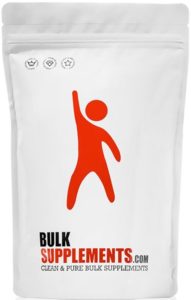
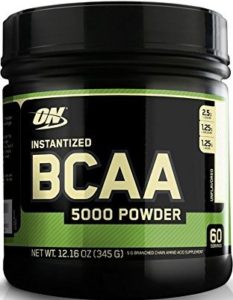

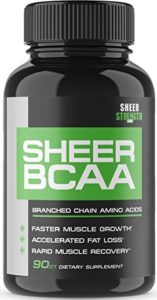

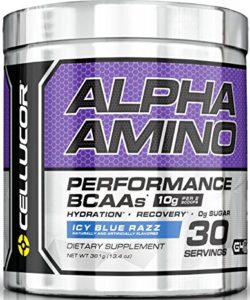



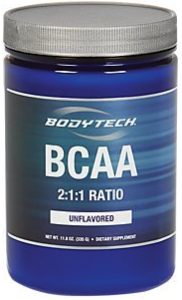
No comments:
Post a Comment